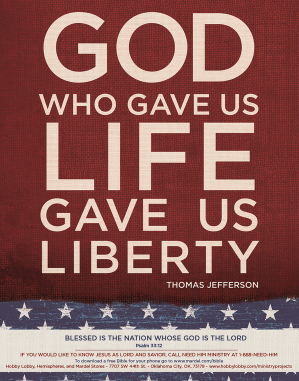The U.S. Supreme Court is scheduled to hear the Hobby Lobby founders' case against the Health and Human Services (HHS) mandate on March 25. The Justice Department appealed to the Supreme Court after the 10th Circuit Court of Appeals had ruled in favor of the Green family's for-profit business in September of last year.
Hobby Lobby employs 28,000 people in over 500 stores nationwide. Its Christian founders operate their business with a faith-based mindset and are known for treating their employees very graciously. The HHS mandate for businesses to provide abortive contraception measures in employee health benefit plans puts the Greens in a difficult position: they must either deny their faith or be fined in excess of $1 million per day if they do not comply with the legislation.
In a short video, the Greens explain how their business came to be and why it is so closely associated with their faith. CEO David Green relayed the family's Christ-exalting hopes for the company in its earliest stages: "Our faith was very important in our starting this company, because we had a real sense - Barbara and I - that God had this purpose in our life," he says. His son Steve, who serves as president of Hobby Lobby, agrees - "We believe that the principles that are taught Scripturally are what we should operate our lives by, so it naturally flows over into the business," he says.
Hobby Lobby is closed on Sundays, and only operates 66 hours per week in order to give employees a better work-life balance. Because it is a for-profit business, the Greens are subject to the HHS mandate which goes against their Christian beliefs. "This is an issue of life," Steve says - "We cannot be a part of taking life, and so to be in a situation where our government is telling us that we have to be is incredible."
The main argument that the case will settle is whether the freedom of religious expression applies to for-profit businesses, as well as individuals. The Green family believes that they are protected under the First Amendment and the Religious Freedom Restoration Act (RFRA), which guarantees persons - whether individuals or businesses - the right to the free exercise of religion. It reads:
"Government shall not substantially burden a person's exercise of religion even if the burden results from a rule of general applicability," which includes "any exercise of religion, whether or not compelled by, or central to, a system of religious belief."
Government lawyers argue that the RFRA "does not entitle [Hobby Lobby] to any exemption for the corporations based on their individual religious belief." The Green's lawyers assert that there is no clause exempting businesses from having freedom of religious expression, however. For instance, the freedom of speech is given to both individuals and to The New York Times.
The National Catholic Register reports that there are 46 additional for-profit businesses that have also filed suit, which includes "Family Talk" radio host Dr. James Dobson and the University of Notre Dame.
"The government is forcing us to choose between following our faith and following the law. I say that's a choice no American and no American business should have to make," says Hobby Lobby's CEO.







